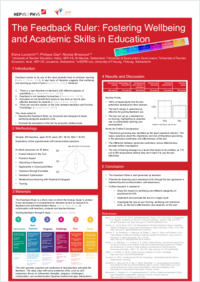The Feedback ruler: fosterring wellbeing and academic skills in education : Feedback: Presentation of a tool aimed at developing students' wellbeing skills and initial evaluations by professionals.
Emotion, apprentissages et bien-être à l'école
- Lucciarini, Elena HEP-VS
- Gay, Philippe HEP-VD
- Bressoud, Nicolas HEP-VS
- 2024
Published in:
- ecpp 2024. - Lucciarini, E. Bressoud, N., Gay, P., (2024, July 11). Feedback: Presentation of a tool aimed at developing students' wellbeing skills and initial evaluations by professionals. [Poster]. Conference ECPP 2024, Innsbruck, Austria. https://www.ecpp2024.com/. - 2024
English
Feedback seems to be one of the most powerful tools to enhance learning (Hattie, 2018). A vast body of literature suggests that wellbeing and learning go hand in hand (Durlak, 2022). However:
feedback is not mastered by teachers (Carless & Boud, 2018; Dawson et al., 2019)
educators do not benefit from ready-to-use tools as how to give effective feedback to students.
There are very few studies on the links between feedback and Positive Education
This contribution aims to present a tool designed for the development of wellbeing skills combined with academic skills and its evaluation by teachers and teachers-to-be. This tool, built from the state of international research on feedback and the theory of self-determination (Deci & Ryan, 2012), and developed in contact with teachers, is called the Feedback Ruler (Lucciarini & Bressoud, 2022). In the form of a 30 cm plastic ruler, it includes a step-by-step procedure for giving feedback in six steps:
Ensure that the timing is right to address feedback;
Discuss the strengths of the work and the approach that led to the performance;
Highlight the progress made since the last evaluation;
Identify elements that deserve improvement;
Develop an action plan to continue improving these points and work on challenges;
Ask how the receiver feels and note if there are any additional elements to add.
Through its steps that clarify the strengths, progress, and challenges of the beneficiary, the Feedback Ruler is aligned with the development of wellbeing skills.
To evaluate this tool, a short presentation was made to nearly 300 teachers aged 18 to 62. With a view to implementation, they evaluated the Feedback Rule with 15 questions according to seven criteria (e.g., their need for training on feedback issues, ease of use, theoretical grounding, possible improvement pathways).
The main results indicate that 89% of the participants think that this tool can be interesting for their practice. The tool's design is perceived as effective in guiding users. Surprisingly, the presence of a strong theoretical foundation is the least endorsed criterion by the participants. In conclusion, the Feedback Ruler is well received and could be an effective means for improving the psychosocial and academic competencies of students (Wisniewski et al., 2020). Research perspectives in this direction are proposed in order to better understand its impact on different categories of psychosocial competencies.
feedback is not mastered by teachers (Carless & Boud, 2018; Dawson et al., 2019)
educators do not benefit from ready-to-use tools as how to give effective feedback to students.
There are very few studies on the links between feedback and Positive Education
This contribution aims to present a tool designed for the development of wellbeing skills combined with academic skills and its evaluation by teachers and teachers-to-be. This tool, built from the state of international research on feedback and the theory of self-determination (Deci & Ryan, 2012), and developed in contact with teachers, is called the Feedback Ruler (Lucciarini & Bressoud, 2022). In the form of a 30 cm plastic ruler, it includes a step-by-step procedure for giving feedback in six steps:
Ensure that the timing is right to address feedback;
Discuss the strengths of the work and the approach that led to the performance;
Highlight the progress made since the last evaluation;
Identify elements that deserve improvement;
Develop an action plan to continue improving these points and work on challenges;
Ask how the receiver feels and note if there are any additional elements to add.
Through its steps that clarify the strengths, progress, and challenges of the beneficiary, the Feedback Ruler is aligned with the development of wellbeing skills.
To evaluate this tool, a short presentation was made to nearly 300 teachers aged 18 to 62. With a view to implementation, they evaluated the Feedback Rule with 15 questions according to seven criteria (e.g., their need for training on feedback issues, ease of use, theoretical grounding, possible improvement pathways).
The main results indicate that 89% of the participants think that this tool can be interesting for their practice. The tool's design is perceived as effective in guiding users. Surprisingly, the presence of a strong theoretical foundation is the least endorsed criterion by the participants. In conclusion, the Feedback Ruler is well received and could be an effective means for improving the psychosocial and academic competencies of students (Wisniewski et al., 2020). Research perspectives in this direction are proposed in order to better understand its impact on different categories of psychosocial competencies.
- Language
-
- English
- License
-
License undefined
- Persistent URL
- https://fredi.hepvs.ch/hepvs/documents/328961
Statistics
Document views: 103
File downloads:
- poster_elu-2: 145
